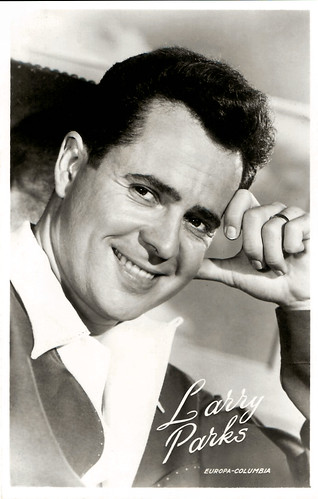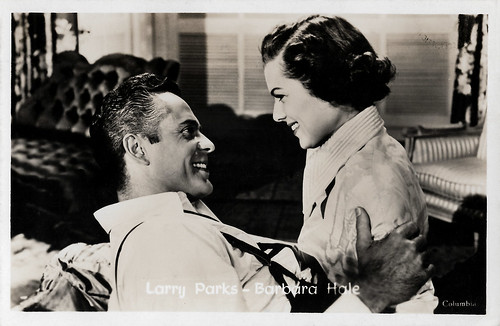
Dutch postcard, no. AX 279. Photo: Europa-Columbia.

Belgian postcard by Nieuwe Merksemsche Chocolaterie S.P.R.L., Merksem (Anvers), no. C 18. Photo: Columbia. Larry Parks and Barbara Hale in Jolson sings again (Henry Levin, 1949).
Mild-mannered comedies, swashbuckling adventures and Al Jolson
Samuel Lawrence Klusman Parks was born in Olathe, Kansas, in 1914. He was the son of Nellie (Klusman) and Frank H. Parks. He was raised in his mother's religion Judaism. As a child growing up in Joliet, Illinois, he was plagued by a variety of illnesses, including rheumatic fever, but persevered with physical exercise and sheer strength of will. In 1932, he graduated from Joliet Township High School. He attended the University of Illinois as a pre-med student.
His plans to become a doctor dissolved when, to the dismay of his parents, he found a passionate sideline in college dramatics. Parks played in stock companies for some years. He made an inauspicious 1937 Broadway debut with a minor role in the Group Theatre's presentation of 'Golden Boy'. He travelled to Hollywood at John Garfield's suggestion, for a role in a Warner Bros. production of 'Mama Ravioli'. Although the film was cancelled, Parks did sign a contract with Columbia Pictures in 1941.
His buildup was slow-moving. He took his first small step with a minor role in Mystery Ship (Lew Landers, 1941). He was oddly cast as an Indian (Jingo-Good) opposite exotic Yvonne De Carlo (Princess Wah-Tah) in The Deerslayer (Lew Landers, 1943). As with most Columbia contract players, Parks received supporting roles in high-budget films and more substantial roles in B pictures. Parks married actress Betty Garrett in 1944.
When Columbia was preparing a biopic of Al Jolson, many big-name stars were considered for the title role, including James Cagney and Danny Thomas, but both turned it down. Resident contractee Larry Parks was reportedly the first actor to be interviewed. Parks impressed the producers and won the role. Parks was coached in the role by Al Jolson himself, whose singing voice was heard throughout the film. Reportedly, this association was a pleasant one until Jolson incensed that Columbia had not asked him to star in his own biopic, viciously turned on Parks and treated him atrociously.
At the age of 31, his performance in The Jolson Story (Alfred E. Green, 1946) earned Parks an Academy Award nomination for Best Actor. Now that he was a fully-fledged star, Columbia kept him busy in elaborate productions. He appeared opposite the studio's biggest star, Rita Hayworth, in Down to Earth (Alexander Hall, 1947). That year, exhibitors voted him the 15th-biggest star in the US. Gary Brumburgh at IMDb: "Larry hoped for equally challenging roles. His hopes were dashed as the studio instead continued casting him haphazardly in mild-mannered comedies and swashbuckling adventures. Other than the box-office sequel Jolson Sings Again (1949), most of Larry's films were hardly worthy of his obvious talent." Parks tried to break his contract with Columbia in 1948 but was unsuccessful. That year he criticised the House Un-American Activities Committee (HUAC). Jolson Sings Again (Henry Levin, 1949) was another huge box-office hit. His co-star in the film, Barbara Hale, teamed with him again in the comedy feature Emergency Wedding (Edward Buzzell, 1950). In 1950 he and his wife announced plans to make their own film, Stakeout. British exhibitors voted him the 9th-most popular star in the UK.

West German postcard by Kolibri-Verlag, no. 440. Photo: Columbia. Larry Parks in The Swordsman (Joseph H. Lewis, 1948).

West German postcard by Kunst und Bild, Berlin, no. A 451. Photo: Columbia. Larry Parks in The Gallant Blade (Joseph H. Lewis, 1948).
Blacklisted in the movie industry
In 1951, Larry Parks was summoned to appear before the HUAC under threat of being blacklisted in the movie industry, but he begged not to be forced to testify. He eventually did so in tears, only to be blacklisted anyway. Parks eventually gave up the names of his former colleagues to the committee.
Following his admission before the committee, Columbia Pictures dropped him from his contract, although it had four years to run. Parks had been set to star in the film Small Wonder, which later became The First Time. At the time, Parks' fee was $75,000 a film.
A romantic comedy he made for MGM, Love Is Better Than Ever (Stanley Donen, 1952) with Elizabeth Taylor, was shelved for a year. He made a TV film for The Ford Television Theatre in 1953 and starred in the British film Tiger by the Tail (John Gilling, 1954) in England. Betty Garrett's career also faced turmoil as a result of her marriage to Parks, and the two spent much of the 1950s doing theatre and musical variety shows.
Parks continued to squeeze out a living acting on the stage and doing occasional television programs. His last appearance in a major role was in the John Huston film, Freud (1962) starring Montgomery Clift. Parks eventually left the film industry and formed a successful construction business. Eventually, he and his wife, Betty Garrett, owned many apartment buildings scattered throughout the Los Angeles metropolitan area. Rather than sell them upon completion, Parks decided to retain ownership and collect rents as a landlord, a decision that proved to be extremely profitable.
During that period, the couple occasionally performed in Las Vegas showrooms, summer stock productions, and touring companies of Broadway shows. Parks died of a heart attack in 1975 at the age of 60. He and Betty Garrett had two sons, actor Andrew Parks and composer Garrett Parks. Larry Parks was also godfather to actor Jeff Bridges.

Dutch postcard, no. A.X. 740. Photo: Metro-Goldwyn-Mayer. Larry Parks, Elizabeth Taylor and Elinor Donahue in Love Is Better Than Ever (Stanley Donen, 1952). Doreen Davis is a mistake.

Dutch postcard by Takken / 't Sticht, no. ax. 260. Photo: Columbia.

Vintage postcard. Photo: Columbia.
Sources: Gary Brumburgh (IMDb), AllMovie, Wikipedia and IMDb.
No comments:
Post a Comment